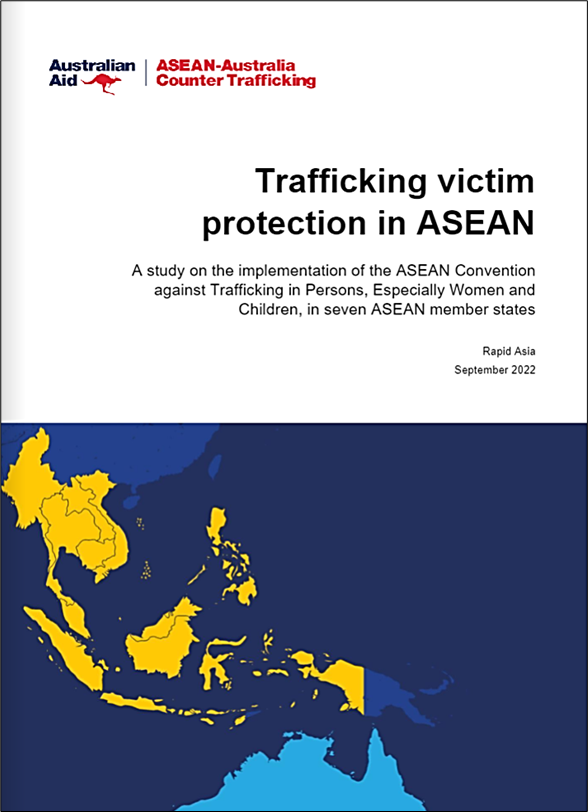The ASEAN Convention against Trafficking in Persons (ACTIP) was signed by ten ASEAN Heads of State in 2015 and became effective in 2017. The issue was recently discussed at the 42nd ASEAN Summit in May 2023.
Rapid Asia conducted a study on behalf of the ASEAN-Australia Counter Trafficking Programme (ASEAN-ACT) to examine ACTIP implementation in seven ASEAN member states, focusing on victim rights and gender equality, disability, and social inclusion. The study takes a constructive look at victim protection and support – how far the region has come since the implementation of ACTIP and where to go next.
Gaps in National Policy and Practice
The study found gaps in national policy, practice, institutional capacities, and the impact of the Covid-19 pandemic. For instance, in one country, the definition of “Trafficking in Persons” (TIP) in national anti-trafficking laws was not aligned with ACTIP. Another finding, the definition of “child” differed from that of the UN Conventions on the Rights of the Child (CRC) or the ACTIP, despite all AMS being signatories of the conventions. Furthermore, there was a discrepancy between what is written in policies (de jure) and what is put into practice (de facto) across the six domains of victim rights (victim identification, right to information, non-criminalization, right to legal assistance, right to remedy, and right to protection and support).
Although some AMS has established guidance on victim identification and referral, there are still varying interpretations of TIP, victims, and challenges in handling particular cases due to the absence of comprehensive national guidelines. Vietnam was the only AMS with explicit provisions regarding victim identification in the laws.
Not all national TIP laws stipulate the right to information, and victims are not always informed of their legal rights in a language and format they can understand. Their legal assistance tends to be limited or inaccessible due to inadequate knowledge of legal practitioners. Access to remedy also remains a challenge in practice, with no clear guidelines to calculate victims’ compensation. Moreover, some countries have not provided clear provisions on the non-punishment of victims’ criminal offences (e.g., illegal entry, falsified documents, or sex work). In contrast, some victims continue to be criminalized for immigration offences.
Gaps in Institutional Roles and Capacities
Institutional roles and capacities also present gaps in practice. Victims have limited access to protection and support, such as shelter, legal assistance, medical treatment, and repatriation. Despite support provision in all AMS studied (except Cambodia), whether it is extended to foreign victims is still unclear. In addition, most jurisdictions neglect men and other marginalized groups due to a lack of clear management guidelines. The Covid-19 pandemic has further exacerbated the situation, with limitations on state budgets to take meaningful action, frontline responders’ capacity and gender diversity, disruption of training, and TIP-savvy officers’ tours of duty. Diverted resources have adversely affected civil society’s work, access, and funding.
The AMS need to prioritize these rooms for improvement to ensure optimum ACTIP implementation. The following key recommendations were made:
1. Develop clear guidelines on victim identification at the national level to ensure victims of trafficking are accurately and expediently identified. There should be clear implementation guidelines to enforce a common understanding of trafficking in persons (TIP) and who is a TIP victim among frontline responders and law enforcers
2. Provide clear and accurate information to victims at all stages of the protection and assistance process, including victim identification, provision of shelter, participation in legal proceedings, and return and repatriation
3. Use victim-centred and gender-sensitive approaches to build the capacity of law enforcement and justice agencies to protect and support TIP victims throughout the criminal justice process. At the same time, protection and assistance services such as shelter should be made available for all TIP victims. Services should be provided in a nondiscriminatory, accessible, and individualized manner, including for adult males, LGBTQI victims, people with disabilities, and other marginalized groups.
The detailed recommendations and full report can be found here
If you found this article useful, please remember to ‘Like’ and share on social media, and hit the ‘Follow’ button never to miss an article.
About the authors: Daniel Lindgren is the Founder of Rapid Asia Co., Ltd. a management consultancy firm based in Bangkok that specializes in evaluations for programs, projects, social marketing campaigns and other social development initiatives. Israr Ardiansyah is an independent consultant working with Rapid Asia.

